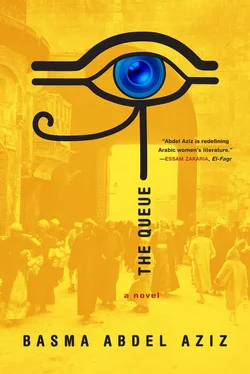Um Mabrouk lamented the loss of the young man and comforted Shalaby, patting him on the shoulder as tears filled her eyes. She had a sense that such a tragic situation was the perfect opportunity for her to tell her own story, about her daughter, and thereby win a bit of sympathy, but Ines seized her chance with an outburst, objecting to Mahfouz being called a martyr. She found herself opening her mouth without thinking again, and casting aside all virtues of silence, caution, and restraint. It was as if she’d left them all outside the classroom door and sauntered back into her Arabic lesson, where she’d always commanded attention.
Mahfouz had begun the attack and so he was to blame, said Ines. He’d killed someone first and paid a fair price. And what’s more, the people who commanded him to kill should be punished too. Didn’t people have enough to deal with every day, with their sorrows and troubles, and the anxiety of waiting, without people’s lives being lost, too? And for what reason?
Um Mabrouk warily tried to silence her — you were never safe these days, not even from your own brother — and when she didn’t succeed she edged away, said goodbye, and started to fiddle with her things. Ines continued her speech for a moment and then stopped, surprised with herself. For the first time in her life, she was speaking her mind in front of others, on a subject besides the lessons she taught her students. She was secretly pleased with what she’d said, and began to play it back to herself, word by word, carefully weighing up the meaning. Yes, she was confident in everything she’d said. Shalaby had provoked something in her, that ignorant fool who thought he was the only one among them who understood anything. He spoke as if his cousin were a gallant knight at war with evil, and not a hapless soul plucked from his land against his will to serve in the security forces, when no one even knew what his unit did. Yet even so, Um Mabrouk was right. If anyone had heard her, or if Shalaby was well connected, he could report what she’d said to an inspector or the courts right away. She could be fired, not just reevaluated, and at that point not even the Certificate of True Citizenship she’d come for would be enough.
Shalaby turned on her like a lion, and would have slapped her across the face were he not so shocked. He could barely process everything he’d heard. No one had attacked Mahfouz’s story before; the whole town remembered him proudly and considered him a hero for God and the Gate. People began to call Mahfouz’s mother “Mother of the Hero,” even “Mother of the Martyr,” and she’d quickly adopted her new name. Shalaby spoke about Mahfouz every chance he got. “Oh, bless him,” some would say; others would offer to help his family, and others shared his grief for his cousin. Still others praised Mahfouz’s courage, bravery, and willingness for self-sacrifice, and some even cursed the men who had hounded him. But this woman standing before him understood nothing. Was she so ignorant that she didn’t know the difference between a filthy criminal and an honorable man? Even if Mahfouz had made a little mistake here or there, he didn’t endanger the country or its people like those rioters did. He’d sacrificed his life for it, and he was brave, maybe braver than all the other guards put together. He’d been a real man, while the man he’d killed — probably without even intending to — had been just a troublemaker, a saboteur, out to frighten people and make their lives more difficult than they already were. That man had ground the country to a halt, he and others who shut down the streets while so many honorable citizens were just trying to earn their daily bread. All of Shalaby’s cousins, and everyone he knew, had come home to the village and were now unemployed.
If he’d been in Mahfouz’s shoes, he would’ve done what Mahfouz had done and more, and if Ines had been defending the nation in his place, she’d know how to obey orders. She would’ve learned that when you’re given an order there’s no discussion, no question, and barely enough time to carry it out — and even if there were time, the Commander wouldn’t let you waste it with stupid questions. If he’d ever heard the things she said from one of his men, he would teach him a thing or two and then lock him up. If this woman had any honor, she would know that to obey your Commander was to obey God, and that insubordination was a sin greater than any mortal could bear and would lead to her own demise. But she was probably corrupt, morally and otherwise — no scruples, no religion, not even wearing a respectable headscarf; he could see a strand of hair hanging down beneath that pitiful scrap of fabric on her head. Yes, she was definitely one of the people the Commander had warned him about, just talking to her was dangerous, she might mess with his mind, try to brainwash him. If she wasn’t one of them, why was she defending them and insulting his cousin, why was she happy that he was dead? She wouldn’t agree that Mahfouz was a martyr, didn’t think his family deserved to be compensated or that he was worth anything at all. It was possible that she had participated in the Disgraceful Events, too; he’d heard rumors that there were women saboteurs.
Nagy discovered that Ehab knew much about life’s mysteries from his work as a journalist and connections to people from all walks of life. Meanwhile, Ehab discovered that Nagy was a well-seasoned veteran of debates and clashes from both his university days and afterward, when he found a job. A long conversation unfurled between them as they told both the notorious and the unsung tales of their lives, exchanged thoughts on the latest developments in the district, and debated what they expected the Gate to do next. Of course it would open, they agreed, but when it did, it would become even more oppressive, and they wouldn’t be rid of it anytime soon. Ehab was guardedly optimistic, while Nagy had long been burdened with an overwhelming sense of futility. In the course of their conversation, he brought up Yehya’s ordeal and mentioned a few details, but not his friend’s name or any information that might reveal why he was in the queue.
But Ehab began to act as though he had put two and two together. He started following Yehya around and checking up on him from time to time, even though his behavior aroused suspicion and Yehya tried to avoid him whenever he saw him coming. Eventually, Ehab convinced Nagy to reveal the rest of the story, thinking that he and Yehya might somehow need his help. From the moment when he understood the whole situation, Ehab refused to leave Nagy alone; he became single-mindedly focused on finding out when Amani was going to Zephyr Hospital. He knew how difficult her mission would be and smelled a story for the paper that was worth the risk. Obtaining any document from that place was like plucking a piece of meat from the mouth of a hungry lion, he said, and the odds of her failure were double those of success. His presence as a journalist could provide some backup and protection, he argued, and besides, he could be more tactful when he needed to be.
An evenly matched debate ensued, Ehab using his journalistic skills to convince Nagy, who resorted to the philosophical arguments in which he was well versed. Nagy didn’t want to expose his friends or add a new level of complication, and he wasn’t sure how Amani would react to Ehab. Nagy insisted that it was useless for Ehab or any journalist to go with her. He knew how capable Amani was (she could pluck the X-ray out of anyone’s mouth — never mind a lion’s) and knew she could do it herself. But despite Nagy’s insistence, Ehab wouldn’t stop pestering him until Nagy agreed to tell him the plan.
Um Mabrouk spread out her mat and began to sleep there most nights. Her son Mabrouk visited almost every day, and the queue delighted him with its potential for fun and games. He started to stop by after school, and soon he spent his weekends there. Away from their musty apartment, his health improved slightly; he gained weight, and his kidney attacks weren’t so severe. One day he brought Um Mabrouk a message from his older sister, who rarely left the apartment these days, asking her mother to send her latest health report. Mabrouk said that she needed it immediately to attach to a job application for a position working at a Booth. Their expenses had doubled since Um Mabrouk had stopped working in the two additional homes, and instead divided her time between the Gate and the office where Amani worked.
Читать дальше











